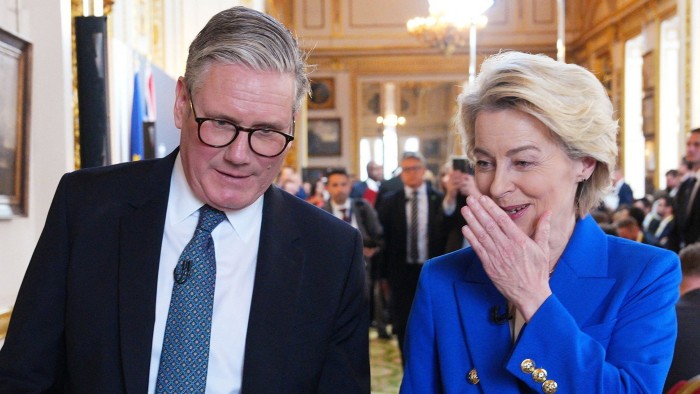Unlock the Editor’s Digest for free
Roula Khalaf, Editor of the FT, selects her favourite stories in this weekly newsletter.
With a bit of historical licence, the UN is celebrating 2025 as the centenary of quantum mechanics. And so we should all reacquaint ourselves with the central theme of that weird science: the vagueness of things at the atomic and subatomic scale. The smallest known phenomena behave like particles. But also like waves. They can have more than one location and momentum — a “superposition” — until measured. After all the Newtonian certainties of the past, the quantum view of the world seemed profane to some physicists, even unscientific. Yet here it still is.
In fact, it is the nation of Newton that lives in accordance with quantum principles all the time. What is Britain’s place in Europe if not a superposition? It is out of the EU. But also, it isn’t. The 46 per cent of British trade that is done with the bloc (no other trade partner comes close, because geography wasn’t abolished in 2016) ensures that rules made in Brussels still impinge on Britain. To boost growth, Sir Keir Starmer’s Labour government wants to align with more of those, which means some loss of independence.
At the same time, Brits continue to visit the continent in their droves because it is next door, whereas the “Anglosphere” can be unaffordable for those who consistently fail to have a rightwing think-tank cover their fare and speaking fee. And so access to the airport e-gates of Nice, Málaga, Rome and the like is another British request, for which the EU wants things in return. As for defence, Britain seeks strength in numbers with Europe at a time of Russian aggression and American aloofness. But that means paying into Europe’s rearmament fund.
And this is just the start. Of course, the next Conservative (or Reform UK) government might unpick some of these emerging ties with the EU. But to the extent that it does, the EU would then claw back the corresponding benefits, which entails another round of negotiations. And the resulting hit to Britain’s businesses or tourists would trigger calls for another go at a rapprochement, which . . .
Britain will never settle its relationship with the EU. Life outside is too difficult, which is why no other member state has left. So is life inside, which is why no British politician of the front rank proposes full re-entry. All that remains is endless adjustment, like someone shifting in a chair for an illusory sweet spot.
Or like Switzerland. The neutral state’s external relations consist in large part of rolling talks with the EU: decade after decade, and often concession after concession. This isn’t the worst fate in the world, if you can live with two conditions. First, the direction of travel will be mostly towards Brussels. (Switzerland is in the Schengen border zone, which even Britain as an EU member wasn’t.) Second, the Swiss have the cushion of fabulous living standards owing to an inimitable economic model, as do those other EU refuseniks, the Norwegians. Whenever Britain miscalculates in balancing independence with access, it will suffer more.
To the question, “Is Britain in Europe, or out?” the answer is obvious: “Yes.” It negotiated almost the hardest possible exit. And there is still just no way on Earth that an entity of 450mn people won’t warp the politics and economics of a mid-sized state off its shore. Legal separation was an entirely legitimate choice. Effective separation was never an option.
The problem is that a referendum didn’t and couldn’t allow for an ambiguous view. It forced public opinion to, in quantum-speak, “collapse” into either Remain or Leave, when in fact millions of voters were fuzzier than that. And so it falls to the government to negotiate over time an improvement to a status quo that commands 27 per cent support.
In doing this, Starmer is being warned not to go too far, lest he provoke an electorate that chose to leave the EU less than a decade ago. I wonder. The Conservatives screamed “surrender” at him this week, to no obvious effect. The share of Brits who think it was right to leave has been stuck at a third since 2022. Every form of reconciliation — joining the customs union, or the single market or the EU itself, or crafting an unspecified “closer relationship” that involves none of these three — polls much better than a harder Brexit. The benefit of the doubt is with Starmer. In fact, the populists’ campaign against his modest efforts reminds me of their growing belief that voters regret the (still sensationally popular) lockdown. It is a case of the public will being misread by those likeliest to invoke it.
Whatever this prime minister achieves in his talks, European diplomacy is Britain’s future. It will be negotiating with the EU for as long as both entities exist. For the EU, this process will be a small part of its overall business. For the UK, it will be central, as each step towards the club entails some sovereign loss and each step back implies a material cost. Before Remainers start gloating about this Forever Summit, it would be no less true if Britain were a full member, as Westminster would be chafing against this or that regulation, this or that federalist scheme.
Ultimately, once the UK’s neighbours decided to combine after the war and it opted out of the first wave, the most that could be hoped for was the least awkward terms with that project, whether from within or without. It is Britain’s fate to be in a superposition, but not a super position.
Read the full article here




